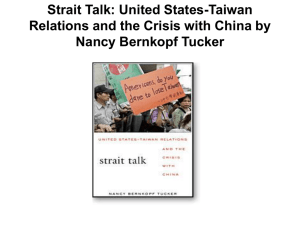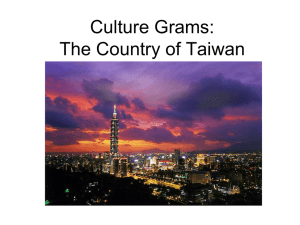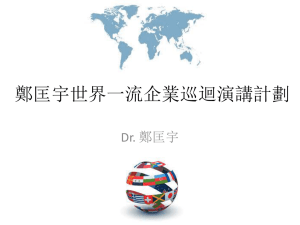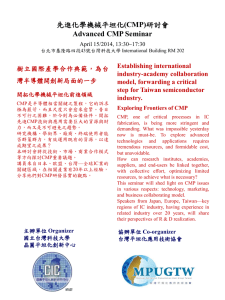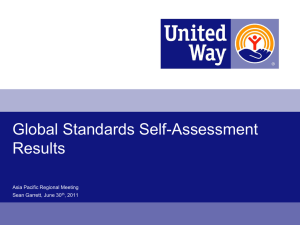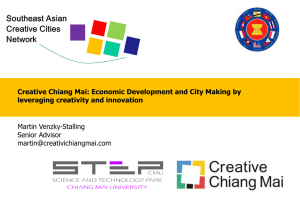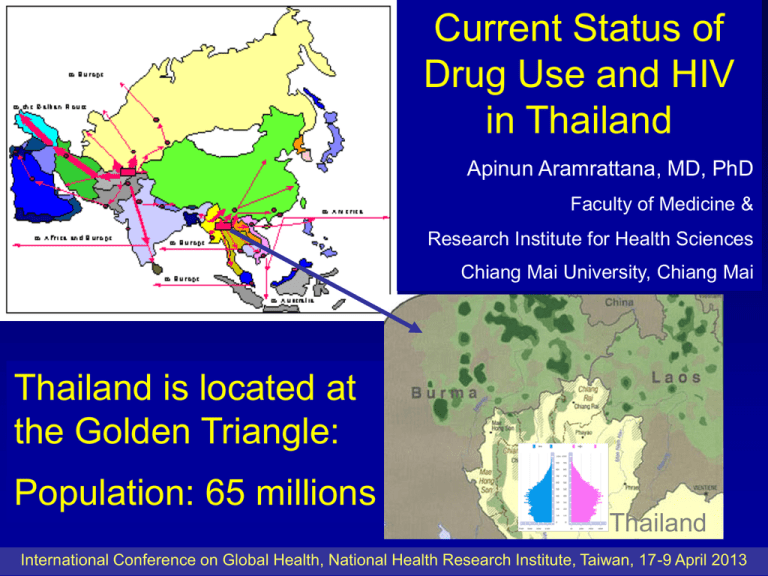
Current Status of
Drug Use and HIV
in Thailand
Apinun Aramrattana, MD, PhD
Faculty of Medicine &
Research Institute for Health Sciences
Chiang Mai University, Chiang Mai
Thailand is located at
the Golden Triangle:
Population: 65 millions
Thailand
International Conference on Global Health, National Health Research Institute, Taiwan, 17-9 April 2013
Transitional patterns of drug users :10 years ago
0.4
0.6
100%
80%
1
1.7
2.6
12.8
7.7
5.3
1.1
10.6
19.3
16.5
13.8
5.3
34.1
53.7
60%
57.4
60.3
6.3
40%
72.5
71.1
73.7
78.2
83.4
84.9
76
5.7
47.8
20%
6.6
32.1
6
24.1
19.6
0%
1990
Heroin
1991 1992
Opium
1993
Ganja
1994
1995 1996
Inhalant
1997
Alcohol
Methamphetamine epidemics has been
predominated since 1996
1998 1999
ATS
2000
Others
Vichai Poshyachinda:
MOPH Drug treatment
statistics
International Conference on Global Health, National Health Research Institute, Taiwan, 17-9 April 2013
Understand young ATS users:Age at first use of methamphetamine • Majority were
40
91%
Percent
30
20
10
0
9
10
11
12
13
14
15
Age
16
17
18
19
20
21
young males
• 99% Inhalation /
take orally
• Multiple sex
partners
• Age of first sex
around 13-14
years
International Conference on Global Health, National Health Research Institute, Taiwan, 17-9 April 2013
Duration of MA use (yrs) and frequency of alcohol
use in last 30 days), Chiang Mai, Thailand, 2005
High prevalence
of depression
(CES-D score >=22)
P < .0001
Male = 31%
Female = 45%
Celentano D D, Aramrattana A, Sutcliffe CG, et.al. (2008) Journal of Adolescent
Medicine. 2(2):66-73.
International Conference on Global Health, National Health Research Institute, Taiwan, 17-9 April 2013
Youth drug related HIV/STD risk in Thailand
Prevalence rates C. trachomatis and N. gonorrhoeae infections,
methamphetamine users, Chiangmai, Thailand, 2005
50
Substance abuse was
associated with sexual
behavioral risks
but not with prevalent STI.
Percent positive
40
30
20
29.4
18.5
10
7.7
5.5
0
Male
Female
Ref.
Chlamydia trachomatis
Male
Female
Ref.
Neisseria gonorrhea
Celentano D, Sirirojn B, Sutcliffe C, et.al. (2008) Sexually Transmitted Diseases 35,400-5.
International Conference on Global Health, National Health Research Institute, Taiwan, 17-9 April 2013
Alcohol and Substance Use Patients at OPD
Suan Prung Psychiatric Hospital 1995-2006
Rehabilitation law
War on drugs
Short-term impacts of the ‘War on Drug’
9% mortality in 5 years among MA psychotic patients.
Main causes were suicide, accidents & AIDS
Source: Kittiratanapaiboon, P.,Suan Prung Hospital, MOPH, Thailand
International Conference on Global Health, National Health Research Institute, Taiwan, 17-9 April 2013
Retrospective trends of new users
YA
Ba
Cigarettes
บุหรี่
(Meth. tab.)
War on drug
2003
Meth. tab. decreased.
Ecstacy increased.
Ice was introduced recently
and increased.
ICE
Ecstacy
(MA crystal)
Trends towards polydrugs use.
International Conference on Global Health, National Health Research Institute, Taiwan, 17-9 April 2013
War on drug effects: Overcrowded prisons
• In 2012, 141 prisons
(1 hospital) in Thailand
contains around 215,000
prisoners.
• About 60% related to drugs,
use or trafficking
• 86% related to ATS
• Overcrowded
• Delay diagnosis and
treatment
0%
1%
4%
7%
2%
Heroin
Marihuana
ATS
86%
Opium
Inhalants
Others
International Conference on Global Health, National Health Research Institute, Taiwan, 17-9 April 2013
Household Survey Trends: Ever users: 2001-2011
Estimated
Numbers
( x 1,000)
Source: ACSAN,
ONCB, 2012
Marihuana is re-emerging.
Ya Ba are increasing again with
Ice emerges on top.
International Conference on Global Health, National Health Research Institute, Taiwan, 17-9 April 2013
Estimated number of ATS users in northern Thailand, 2011: 311,600
Research Institute for Health
Sciences, Chiang Mai University, 2011
1.4 %
>26
12.0 %
4-26
86.6 %
0-3
WHO-ASSIST Score among ATS ever users, Household Survey, 2011.
International Conference on Global Health, National Health Research Institute, Taiwan, 17-9 April 2013
HIV prevalence among Injection Drug Users:
Trends from HIV Sero-Sentinel Surveillance (HSS)
%
HIV prevalence among IDUs in drug treatment centers
60
50
40
30
20
10
1989
1990
1991
1992
1993
1994
1995
1996
1997
1998
1999
2000
2001
2002
2003
2004
2005
2006
2007
2008
2009
2010
2011
0
National
Bangkok only
Source: 1989-2011 HSS, Bureau of Epidemiology (BoE), Thailand (2012)
International Conference on Global Health, National Health Research Institute, Taiwan, 17-9 April 2013
Number of provinces
reporting
HSS data among IDUs
50
40
30
20
10
1989
1991
1993
1995
1997
1999
2001
2003
2005
2007
2009
2011
0
Number of sites
Source: 1989-2011 HIV Sero-Sentinel Surveillance, BOE (2012)
International Conference on Global Health, National Health Research Institute, Taiwan, 17-9 April 2013
IDU size estimation: Background
• HIV prevalence among IDUs have been 30-50% since 1992.
• Little data was available on the size of the IDU population.
• The previous estimate of IDU population size for Bangkok
in 1991, using capture-recapture method, were 36,600
(Mastro et al, 1994). This was divided by 0.224 (19801999 Bangkok/Nationwide IDU-associated AIDS case ratio)
to give a national estimate of 160,000 for 1980-1995
(Asian Epidemic Model, 2008).
• In 2004 Wattana et al., using RDS and multiplier methods
to come up with Bangkok estimate. With the same
method and additional assumptions, the national estimate
was then calculated to be 38,380 IDUs (Asian Epidemic
Model, 2008).
International Conference on Global Health, National Health Research Institute, Taiwan, 17-9 April 2013
IDU size estimation: Current status
National Household Survey on Substance Abuse, 2011
Method: Ask direct question ‘Have you ever injected drug?’
Results: Ever injected any drugs = 29,300 IDUs
Asian Epidemic Model based on RDS study in Bangkok, 2004
Method: Assumptions 1: 30% underestimation
Assumption 2: Bangkok/National AIDS case ratio
can be a multiplier.
Results: Any injections in the past 6 months = 38,300 IDUs
Nation-wide Network Scale-Up Survey, 2010
Methods: Known population scale-up & Summation
Results: IDUs known in the past 2 years = 40,300 – 97,300
Consensus number (10 Jan. 2012) = 40,300
International Conference on Global Health, National Health Research Institute, Taiwan, 17-9 April 2013
10000
Injection trends
among drug
dependence
patients, 2003-12
Heroin
Opium
1000
เฮโรฮีน
Ya-Ba
ฝิ่ น
100
ยาบ้า
10
ไอซ์
Number
Ice
2
1
2545
2546
2547
2548
2549
2550
2
2551
4
2
2552
2553
4
2554
100.0
• Most common was
heroin
10.0
เฮโรอีน
ฝิ่ น
1.0
• Second most common
were Ya-Ba and opium
2545
2546
2547
2548
2549
2550
2551
2552
2553
2554
ยาบ้า
ไอซ์
0.1
%injection among each drug type
0.0
Source: Office of Narcotics Control Board database, (2012)
International Conference on Global Health, National Health Research Institute, Taiwan, 17-9 April 2013
• Military conscripts 2nd round, 2011 26,761 males
• Ever used drug
14,596 (55%)
Non-injection 13,519 (50.6%) ;
81% of Non-IDUs
used Ya-Ba.
Injection 1,077 ( 4.0%)
Majority of IDUs
were Ya-Ba
injectors!
Source: Rangsin’s presentation, MOPH workshop, November 2012, Chiang Mai
International Conference on Global Health, National Health Research Institute, Taiwan, 17-9 April 2013
Respondent-Driven Survey (RDS) 2009, Thailand
( RDS, 2009)
Bongkok
Age < 25 years (%)
Chiang Mai
3
42
% Male
83
83
% Injection drug experience
Heroin
Methamphetamine
Midazolam
Methadone
Opium
34
63
42
13
NA
34
32
4
6
14
5
48
24
11
% Sharing needle at last injection
% HIV prevalence
IDUs in Bangkok and Chiang Mai were poly-drug users.
International Conference on Global Health, National Health Research Institute, Taiwan, 17-9 April 2013
Response of Thailand to drug use
related HIV epidemic
- Outreach for education, counseling and engaging
- Needle and syringe exchange program (NSP)
- Expanding HIV voluntary counseling and testing
- Scale-up methadone maintenance treatment
- ARV and related programs
- Prison programs
These are currently supported by the Global Fund
round 8 through CHAMPION IDU program.
1st November 2010, Prime Minister approved National HIV
prevention and care plans including NSP. However, current laws
still allow polices to arrest people who carrying syringes.
International Conference on Global Health, National Health Research Institute, Taiwan, 17-9 April 2013
Available services for drug users
(Rapid Assessment and Responses (RAR): Chiang Mai 2010)
•Peer group: Thai Drug User Network (TDN)
Population Service International (PSI)
- Drop-in centers and outreach activities by
peers providing education, information and
counseling, needle and syringe exchange
•GO: Drug Treatment Centers, Hospitals
- HIV voluntary counseling and testing (VCT)
- CD4 test (free)
- Methadone maintenance treatment
- ARV programs through universal coverage
including prison settings
:Prisons - HIV education program, VCT, Tbc
- Methadone program is under planning.
International Conference on Global Health, National Health Research Institute, Taiwan, 17-9 April 2013
Current Status of
Drug Use and HIV
in Thailand
Apinun Aramrattana, MD, PhD
Faculty of Medicine &
Research Institute for Health Sciences
Chiang Mai University, Chiang Mai
Thank you very much.
Q&A
Thailand
International Conference on Global Health, National Health Research Institute, Taiwan, 17-9 April 2013

